
A Holistic Approach to Supporting Students’ College and Career Readiness
In recent years, Tennessee education leaders have expressed concern over stagnant or declining college enrollment rates and a weak education-to-workforce pipeline.1 According to the State Collaborative on Reforming Education, only 26 percent of Tennessee students who started high school in 2012 earned a postsecondary degree by summer 2022, with even ...
Scaling for System-Level Change: A Conversation with Suzanne Donovan and Vanessa Coleman
Suzanne Donovan, executive director of the Strategic Education Research Partnership (SERP) Institute, and Vanessa Coleman, co-director of SRI’s Center for Education Research & Innovation, recently sat down for a conversation with Kori Hamilton Biagas to discuss scaling innovations that disrupt inequity and create system-level change ...

Changing Graduation Requirements for a Changing World
What do high school graduates need to know and be able to do to be prepared for college and career? This is the fundamental question that state policy makers confront when determining minimum high school graduation requirements or assessing whether these requirements need to change to meet the needs of ...

Three Ways to Use Equity-Focused Language When Communicating Student Performance Data
New performance data gets released. Without even seeing the data, what would you predict is the pattern? For over 20 years, since No Child Left Behind, we have seen the same, predictable performance differences. And for over 20 years, there's been a desire to quickly compare data points, find bright ...

It’s a New Phase for the National Network
One objective within our Equitable Pathways to College and Career team is to highlight projects and initiatives that weave equity-driven practices into the fabric of our work. One such initiative is supported by the National Science Foundation (NSF)—NSF's Eddie Bernice Johnson INCLUDES Initiative (NSF INCLUDES) ...

How Educators Can Embed Social-Emotional Learning and Trauma-Sensitive Practices Across Students’ Educational Experience
Many students today have experienced waves of trauma—from the pandemic, opioid crisis, racial injustice, poverty, inequality, violence, and more. Many, if not all, students and families are affected, and schools play a central role in providing critical supports ...

Lessons for Equitably Scaling Deeper Learning
Thinking critically, working collaboratively, communicating effectively, learning how to learn—these are the types of deeper learning competencies that students will need to master to be successful in the rapidly evolving future of work and citizenship ...

Rethinking How We Measure Student Progress to High School Graduation
Finishing more years of high school, and especially earning a diploma, is associated with a decreased risk of premature death, increased prospects for employment, and a higher lifelong earning potential ...

Learning to Support Equitable School Transformation
As foundations grapple with how to advance equity, many are seeking to reimagine learning and evaluation in their grantmaking ...

Measuring School Climate
Getting and using feedback from students themselves about their school experiences is key to understanding school climate. But how do school and district leaders know which measures to use? ...

Supporting Complex Networks Through Equity-Driven Practices
The imperatives facing public education right now, given all the issues laid bare by the pandemic and centuries of barriers systemically rooted in racism and White supremacy, require complex, intentional, equity- and relationally driven partnership approaches ...

When Educators’ Needs Exceed the Research Base
"What does the research say?" Educators ask and are asked this question frequently. Appropriately, professionals are encouraged to look to the evidence base when they encounter a problem of practice ...

Supporting Students With Significant Cognitive Disabilities and Support Needs as They Transition from High School
Researchers from SRI and the University of Oklahoma are collaborating to create a new assessment tool to help educators ensure that students with significant cognitive disabilities (or extensive support needs) leave high school with the skills they need to be successful ...

Supporting a Rural, First-Generation College Improvement Network
When a group of West Virginia educators set a goal of doubling the number of STEM college graduates statewide in a decade, they faced long odds ...
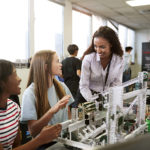
Supporting low-income and Latinx students in STEM: Los Angeles City College’s STEM Pathways Program
Although nationally Latinx students declare majors in science, technology, engineering, and math (STEM) fields at similar rates as White students, our postsecondary education systems lose Latinx students along the way, resulting in disproportionately fewer Latinx STEM majors and degree holders ...

Can Open Education Support Equity in Community Colleges?
SRI Education is working to fill the gap in evidence on changes in instruction from the use of open educational resources (OER) in community colleges. Building on the prior study of the OER Degree Initiative, we are investigating how the use of OER can enable what are sometimes called “open ...

How Community Colleges Can Build Employability Skills for STEM Technicians
Over the past 2 decades, the United States has seen enormous growth in the science, technology, engineering, and mathematics (STEM) fields. This growth has been particularly strong for high skill technician jobs in technology and computer science, which offer a promising path to the middle class for many Americans ...

Then and Now—and Now What? Career and Technical Education Credential Attainment in Virginia
In an effort to ensure that students graduate from high school ready for success in postsecondary education or the workforce, Virginia implemented a new policy that, starting in 2017, required nearly half of public school graduates to earn a career and technical education (CTE) credential. This ...

The Potential of College and Career Pathways in Alternative School Settings
Alternative high schools were originally conceived of as a place where students who were not succeeding in a traditional setting could have their academic needs met. These schools have developed negative stigmas, with the reputation as being credit-recovery factories for students who are off-track to graduate ...

New Research Center Aims to Address Inequities in Online Learning in College
College instructors see it all the time. Each semester brings bright students who easily grasp new ideas, but may struggle with assignments or studying for exams. These students can excel when explicitly taught skills to manage their own learning, research conducted by Dr. Omar Faison at Virginia State University has ...
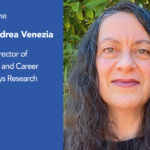
Introducing Dr. Andrea Venezia, the New Director of College and Career Pathways Research at SRI Education
Dr. Andrea Venezia joined SRI Education in May as our new director of college and career pathways research, co-leading the program area with Dr. Miya Warner. Most recently, Andrea was a professor of public policy and administration at Sacramento State University and executive director of the Education Insights Center ...
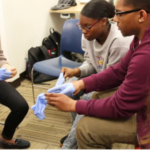
How Do They Fare? The Impact of Participating in Health Pathways on Student Outcomes
The Oakland Health Pathways Project involves education and industry partners in expanding education and long-term employment opportunities for youth of color in Oakland, California. Project partners used the Linked Learning approach to engage students in education and employment experiences related to the health care field ...
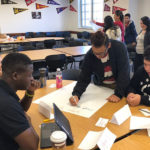
Engaging Students in Designing Equitable Schools
Including student voice in school design is an important strategy for promoting and facilitating educational equity. Ensuring that all students’ backgrounds and perspectives are considered is especially critical during a time when many people in the United States continue to experience the injustice of racial and social inequities ...
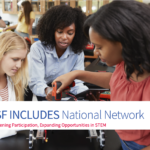
Coordination Hub Research Brief: Evidence-Based Strategies for Broadening Participation in STEM
How can educators develop and implement strategies that attract and retain Black or African American, Hispanic or Latino, American Indian, Native Hawaiian, Alaskan Native, and other Pacific Islander students and professionals in STEM? ...
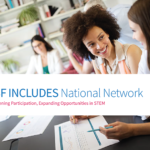
NSF INCLUDES Funds Re-Entry of Women and Women Veterans into the STEM Workforce
Broadening participation in the STEM workforce means taking into account non-traditional academic and career pathways. It can also mean welcoming back people who seek to return to or advance STEM career pursuits they had left behind to join the military, raise families, or for other reasons ...

More Than Getting to the Door: Non-Academic Supports to Ensure Students Graduate from College (Part 4—Academic Self-Efficacy)
Every fall semester, first-time college students across the country embark on an academic journey full of promise. Unfortunately, some students do not make it to the finish line because they have trouble adjusting to the academic demands of college ...

More Than Getting to the Door: Non-Academic Supports to Ensure Students Graduate from College (Part 3—Institutional Knowledge Required to Navigate Higher Education Systems)
Academic institutions can be difficult to navigate, especially for students who do not have college-educated parents. At 4-year institutions, first-generation students are twice as likely than students whose parents have a bachelor’s degree to leave before their second year ...

More Than Getting to the Door: Non-Academic Supports to Ensure Students Graduate from College (Part 2—Financial Supports Beyond Institutional Financial Aid)
The high cost of tuition at public and private 4-year academic institutions is a hot topic in national media today. However, students face many financial barriers to degree completion introduced by expenses that aren’t fully covered by their financial aid packages ...

More Than Getting to the Door: Non-Academic Supports to Ensure Students Graduate from College (Part 1—An Overview)
The transition from high school to college can be difficult in the best of times, let alone during a global pandemic. Our previous post on Supporting Postsecondary Transitions During COVID-19 offers practical resources for supporting students and families navigating the college application and enrollment process during the pandemic ...

Three Ways to Build College Knowledge in High School
The college application and transition process can be overwhelming for young adults, particularly for first-generation college-goers. Students who are accepted to college can easily wander off the pathway from high school to eventual postsecondary degree attainment ...

Parent Perspectives on Barriers to Postsecondary Education
Parents undoubtedly want the best for their children, including good health, economic security, and happiness. Postsecondary education can support these aspirations, because those who attain postsecondary credentials have well documented advantages in rates of employment, earnings, positive health outcomes, and civic engagement ...
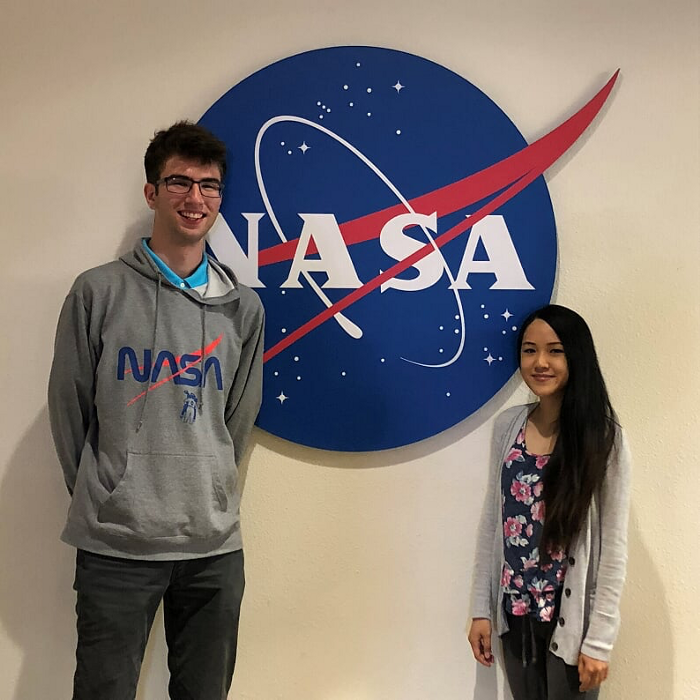
Virtual internship study aims to develop guidance for employers
Some STEM employers saved summer internship programs with a quick pivot to virtual. But how did that go? An NSF-funded study is finding out, with the goal of helping STEM virtual internships work better for more employers and students next summer and beyond ...

Data in Action: Using Labor-Market Alignment Data to Improve Career and Technical Education
In a recent Institute of Education Sciences report, Regional Educational Laboratory Appalachia partnered with the West Virginia Department of Education to conduct a first-of-its-kind study to determine the alignment between the state’s high school career and technical education offerings and high-demand occupations that do not require additional postsecondary education ...

Supporting Postsecondary Transitions During COVID-19: Practical Resources and Considerations
The COVID-19 pandemic has disrupted the college application, financial aid, and decision-making processes for students and families seeking a higher education. K–12 and higher education practitioners now have an opportunity to innovate how to support students through what is currently uncharted territory ...
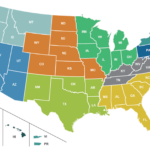
Measuring Career Readiness: What, Why, and How
The question of how schools can best prepare students to enter the workforce is raised constantly in settings from classrooms to boardrooms; the answer, however, remains elusive. Employers increasingly critique the preparation of incoming graduates, with only 11 percent agreeing that students have the skills and competencies needed to succeed ...
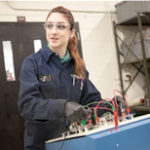
Supporting Positive Culture in CTE Programs
The 21st century economy demands an educated workforce with advanced skills and knowledge. Providing students with opportunities for high-quality, rigorous career and technical education (CTE) is receiving increasing attention across the United States ...
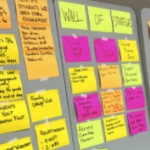
Leveraging the Rural Context to Build Family Engagement
At Regional Educational Laboratory Appalachia, we travel through rural eastern Kentucky and work with school leaders. They regularly share that students in Appalachia face significant barriers to postsecondary success such as lack of exposure to models of college and career success, lack of confidence to pursue postsecondary opportunities, and low ...

OER Degrees Can Cut College Costs for Students and Improve Course Material Alignment
A new SRI report, Participant Experiences and Financial Impacts: Findings from Year 2 of Achieving the Dream’s OER Degree Initiative, provides evidence that degree pathways based on Open Educational Resources (OER) can increase college affordability and provide more engaging, relevant, and well-aligned instructional materials than courses using traditional textbooks ...

Insights from Linked Learning into Equitable Career Pathway Implementation
In SRI International’s new brief, Access and Equity in Linked Learning, we share what we’ve learned about the promise and challenges of achieving equitable, career-themed pathways from our 7-year study of Linked Learning ...

Turning Autism Research into Support for Learning
My research focus, autism, affects people and their ability to function in different ways across the spectrum. For those who have mild-to-moderate autism and are considered "high functioning," many do incredibly well intellectually, but still often fare poorly at life. We see these people not going to college and not ...
